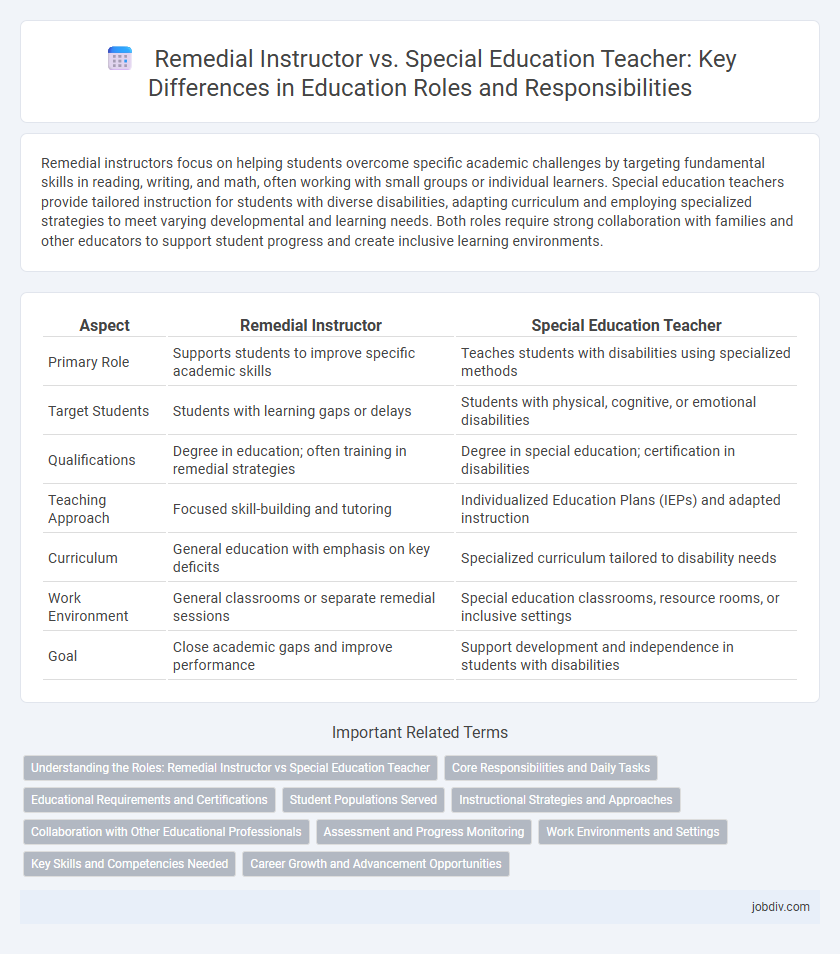Remedial instructors focus on helping students overcome specific academic challenges by targeting fundamental skills in reading, writing, and math, often working with small groups or individual learners. Special education teachers provide tailored instruction for students with diverse disabilities, adapting curriculum and employing specialized strategies to meet varying developmental and learning needs. Both roles require strong collaboration with families and other educators to support student progress and create inclusive learning environments.
Table of Comparison
| Aspect | Remedial Instructor | Special Education Teacher |
|---|---|---|
| Primary Role | Supports students to improve specific academic skills | Teaches students with disabilities using specialized methods |
| Target Students | Students with learning gaps or delays | Students with physical, cognitive, or emotional disabilities |
| Qualifications | Degree in education; often training in remedial strategies | Degree in special education; certification in disabilities |
| Teaching Approach | Focused skill-building and tutoring | Individualized Education Plans (IEPs) and adapted instruction |
| Curriculum | General education with emphasis on key deficits | Specialized curriculum tailored to disability needs |
| Work Environment | General classrooms or separate remedial sessions | Special education classrooms, resource rooms, or inclusive settings |
| Goal | Close academic gaps and improve performance | Support development and independence in students with disabilities |
Understanding the Roles: Remedial Instructor vs Special Education Teacher
Remedial instructors focus on helping students overcome learning difficulties by providing targeted support in specific academic areas such as reading, writing, or math. Special education teachers work with students who have diverse disabilities, creating individualized education plans (IEPs) to address a wide range of cognitive, emotional, and physical challenges. While remedial instruction targets skill gaps in general education settings, special education encompasses broader, legally mandated accommodations and specialized instructional strategies.
Core Responsibilities and Daily Tasks
Remedial instructors focus on helping students overcome specific academic challenges by providing targeted instruction in subjects like reading or math, often working with students who need extra support to meet grade-level standards. Special education teachers design and implement individualized education programs (IEPs) tailored to students with diverse disabilities, addressing both academic and behavioral needs. Both roles require ongoing assessment, collaboration with parents and staff, and adapting teaching strategies to support student progress effectively.
Educational Requirements and Certifications
Remedial instructors typically require a bachelor's degree in education or a related field, coupled with state certification in remedial or general education, while special education teachers must obtain a bachelor's degree in special education or a specialized subject area and acquire state-specific special education certification. Special education teachers often need additional credentials, such as a master's degree or specialized training in disability services, to address diverse learner needs effectively. Both roles mandate continuous professional development to maintain licensure and stay current with instructional strategies and legal regulations.
Student Populations Served
Remedial instructors primarily serve students who struggle with general academic skills, focusing on those needing extra support in reading, writing, or mathematics to meet grade-level expectations. Special education teachers work with students who have diagnosed disabilities, including cognitive, physical, emotional, or developmental challenges, providing tailored instruction to meet individualized education plans (IEPs). Both roles aim to enhance student learning outcomes but target distinctly different populations based on specific educational needs.
Instructional Strategies and Approaches
Remedial instructors concentrate on targeted skill reinforcement using structured, repetitive drills and individualized practice to address specific learning gaps in subjects like reading and math. Special education teachers employ diverse, adaptive instructional strategies tailored to accommodate various disabilities, integrating sensory activities, assistive technology, and differentiated instruction to support inclusive learning environments. Both roles prioritize personalized learning but differ in focus: remedial instruction emphasizes skill mastery, while special education addresses broader cognitive, emotional, and physical needs.
Collaboration with Other Educational Professionals
Remedial instructors collaborate closely with general education teachers to provide targeted support and develop individualized learning plans that address specific academic challenges. Special education teachers work alongside speech therapists, school psychologists, and occupational therapists to create comprehensive, multidisciplinary strategies tailored to students with disabilities. Effective collaboration among these professionals ensures seamless integration of services and maximizes student learning outcomes.
Assessment and Progress Monitoring
Remedial instructors specialize in assessing learning gaps through diagnostic tests and continuously monitor student progress to adjust tailored intervention strategies. Special education teachers conduct comprehensive assessments based on Individualized Education Programs (IEPs) and frequently evaluate student growth using specialized tools to ensure compliance with legal and educational standards. Both roles prioritize data-driven progress monitoring to enhance targeted instructional practices and improve student outcomes.
Work Environments and Settings
Remedial instructors typically work in general education classrooms, tutoring centers, or after-school programs to support students struggling with core subjects like math or reading. Special education teachers are primarily employed in specialized classrooms, resource rooms, or inclusive settings within public or private schools, catering to students with disabilities or individualized education plans (IEPs). Both professionals collaborate with educators and support staff but differ in the intensity and specialization of their environments and student needs.
Key Skills and Competencies Needed
Remedial instructors require strong diagnostic skills and proficiency in individualized lesson planning to address students' specific learning gaps effectively. Special education teachers must possess deep knowledge of diverse disabilities, adaptive teaching strategies, and strong communication skills for collaborating with families and multidisciplinary teams. Both roles demand patience, empathy, and the ability to implement evidence-based interventions tailored to students' unique needs.
Career Growth and Advancement Opportunities
Remedial instructors typically focus on addressing specific learning gaps through targeted interventions, which can lead to career growth by advancing into roles such as curriculum specialist or instructional coordinator. Special education teachers have broader responsibilities, working with students with diverse disabilities and often progressing into leadership positions like special education program director or inclusion specialist. The demand for special education expertise usually offers more diverse advancement opportunities within school administration and educational policy development.
Remedial Instructor vs Special Education Teacher Infographic

 jobdiv.com
jobdiv.com